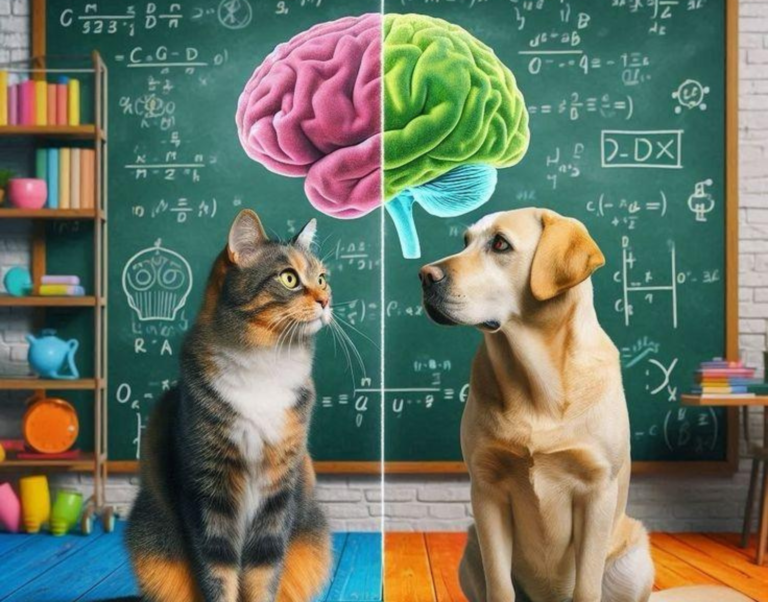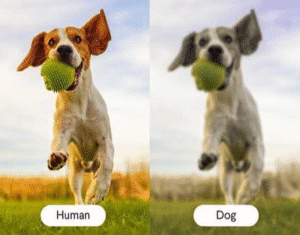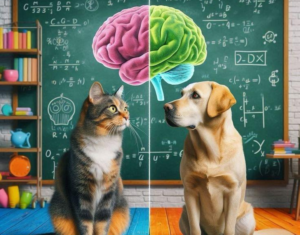Let me start with a confession (because honesty is the best policy, especially when your pets are always watching): I live with both a cat and a dog. Yep, under one roof. Whiskers (my cat) firmly believes he’s descended from Egyptian royalty and treats me like the humble servant I was clearly born to be. Max (my lovable Labrador), on the other hand, thinks I personally hung the moon and once tried to befriend a vacuum cleaner like it was a long-lost cousin.
So naturally, when I sit down and wonder, which one of these furballs is smarter? I instantly hear dramatic music playing in my head, like we’re in a pet-themed telenovela.
Оглавление
It’s the ultimate showdown: Cat vs. Dog Intelligence. And no, this isn’t just about who can sit, stay, or roll over on command or who has the better poker face (Whiskers wins, paws down). We’re digging deep into the world of animal cognition, problem-solving prowess, emotional IQ, and yes, who’s the real master of manipulation in the house. Buckle up, fellow pet people, this ride’s gonna be both enlightening and hilarious.
What Do We Even Mean By “Smart?”
Before we start handing out IQ points like treats, let’s discuss what intelligence actually means when it comes to pets.
For humans, intelligence usually involves things like logic, memory, problem-solving, and social skills. For our furry companions, it’s a bit more nuanced. According to animal behaviorists, intelligence in animals is measured by:
- Problem-solving skills
- Social intelligence (understanding humans and other animals)
- Memory and learning ability
- Communication skills
- Adaptability
Training and obedience can be indicators, but don’t confuse obedience with brainpower. Just because your cat doesn’t come when you call doesn’t mean they didn’t understand you. (Spoiler: They understood. They just chose violence.)
The Case for Dog Intelligence
Let’s start with man’s best friend. Dogs have been studied extensively over the years, and here’s what the science says:
1. Social Smarts for the Win
Dogs are masters of social intelligence. They’ve evolved alongside humans for thousands of years, and some researchers argue that dogs are better at reading human emotions than even our closest primate relatives.
Ever noticed how Max gives me those classic puppy eyes when I’m sad or brings me a slobbery toy when I look stressed? That’s emotional intelligence in action. Dogs are incredibly attuned to our body language, tone of voice, and even facial expressions; they just get us on a level that feels almost spooky. Sometimes, I think Max knows I’m upset before I do. He’s like a furry emotional support unit with a tail.
2. Obedience and Learning
Dogs are famously trainable, especially breeds like Border Collies, Poodles, and German Shepherds. The average dog can learn up to 165 words, while some top-tier canine geniuses (looking at you, Chaser the Border Collie) can understand over 1,000. That’s toddler-level vocabulary, and honestly? Impressive.
Max knows his basic commands, a few fancy tricks, and after months of dedicated effort, not to jump on Aunt Margie when she visits. (Progress is progress, people.) He still forgets when she brings snacks, though. We’re working on it.
3. Working Intelligence
From guiding the visually impaired to sniffing out contraband at airports, dogs aren’t just pets; they’re literal employees with benefits (well, treats). They excel in jobs that require following commands, detecting scents, and staying calm under pressure. I mean, Max can’t hold down a 9-to-5, but he can alert me when the mailman arrives like it’s breaking news.
TL;DR: Dogs are incredibly smart when it comes to communication, obedience, and emotional bonding, and let’s be honest, they’re overachievers with wagging tails.
The Case for Cat Intelligence
Now, let’s talk about the divas of the pet world. Cats might not bring you your slippers or help you cross the street, but don’t be fooled. Their brains are fascinatingly powerful.
1. Self-Reliant Geniuses
Cats are incredibly independent, and that’s not a sign of aloofness; it’s a reflection of their evolved intelligence. Unlike dogs, who are pack animals, cats are solitary hunters. They rely on stealth, precision, and quick decision-making to survive in the wild (and, apparently, in my living room).
Translation? Whiskers isn’t ignoring me. He’s just busy running a full-blown mental cost-benefit analysis on whether petting time is worth interrupting his nap, his sunbathing schedule, or his ongoing feud with the houseplant. Priorities.
He doesn’t need my approval. He doesn’t even need me, really—except when the food bowl is half-empty, and the apocalypse must clearly be near. This level of self-sufficiency? That’s cat genius right there. Calculated. Cool. And mildly condescending.
2. Memory Masters
Cats have an excellent long-term memory. They remember routines, places, people, and even grudges. (Whiskers still gives the vet a death glare two years after That One Time… you know, the thermometer incident.)
What’s wild is that studies show cats outperform dogs in short-term memory, especially when it comes to locating hidden objects. So, if you think you’ve cleverly tucked away the treats? Think again. Whiskers probably clocked your hiding spot, calculated the trajectory, and filed it under “To Be Raided Later.”
He may act unbothered and aloof, but that’s just because he’s already memorized the exact time you usually open the fridge, the precise sound of the treat jar, and how to guilt-trip you with a single blink. Now, that’s mental gymnastics.
3. Problem-Solving and Manipulation
If intelligence is about getting what you want, then cats might be evil geniuses. Ever had a cat meow in a very specific tone just to get you to fill their food bowl early? Or knock things off the counter while staring you straight in the eyes like a tiny, furry mob boss?
Whiskers doesn’t just ask for what he wants; he strategizes. He knows how to manipulate every member of this household with surgical precision. He’ll cuddle up to my roommate just long enough to get treats, then vanish like a shadow ninja. It’s low-key terrifying and a little impressive.
Comparing the Brainiacs
Let’s break it down like a good old pet report card:
| Trait | Собаки | Кошки |
| Social Intelligence | A+ | B |
| Trainability | A | C+ |
| Problem-Solving | B+ | A |
| Memory | B | A+ |
| Emotional Recognition | A | B- |
| Manipulation Skills | C | A++ |
As you can see, they both excel but in very different arenas. Dogs are team players. Cats are managers.
What the Science Says
So far, most scientific studies lean slightly in favor of dogs but with big caveats.
A study from Vanderbilt University found that dogs have more neurons in their cerebral cortex (around 530 million) compared to cats (about 250 million). More neurons generally mean more processing power.
But wait, cats have larger brains relative to their body size, and they can learn by observation, which not all dogs do well.
Sorry Grumpy Cat, study finds dogs are brainier than cats
Also, dogs want to please humans. Cats? They’re more likely to ignore a command just to test your patience. That doesn’t make them less intelligent. That makes them… strategic.
Real-Life Scenarios: Who’s Smarter?
Let’s have some fun.
Scenario 1: Your pet is stuck in a room with a closed door and a treat on the other side. What happens?
- Max scratches, whines, and maybe waits for me to open it.
- Whiskers finds the weakest point in the door frame, squeezes through a vent, and eats the treat and Max’s.
Scenario 2: You pretend to throw a ball.
- Max runs for it twice. On the third time, he side-eyes me.
- Whiskers never moved. He already knew I was bluffing.
Scenario 3: You bring home a new gadget.
- Max barks at it.
- Whiskers dissects it with his eyes and then sits on it so no one else can use it.
Verdict? They’re both clever. In wildly different ways.
The Final Verdict
So, who’s the winner in the great intelligence battle?
Neither. And both.
Dogs and cats are smart in different ways, and trying to compare them is like asking whether Einstein or Da Vinci was smarter. One is a collaborative genius, and the other is a quiet mastermind.
Dogs will charm your socks off and learn every trick in the book to make you smile. Cats will make you earn their approval and solve problems like little furry engineers.
I say we call it a tie and let them each have a treat and maybe a nap.
Основные выводы
- Intelligence varies by species, breed, and individual personality.
- Dogs tend to excel in social intelligence, obedience, and emotional recognition.
- Cats shine in memory, problem-solving, and independent thinking.
- Scientific studies show dogs may have more brain neurons, but cats often outperform in cunning and manipulation.
- At the end of the day, intelligence isn’t just about tricks, it’s about how pets adapt, interact, and enrich our lives.
And that’s it, fellow pet parents. Whether you’re Team Cat, Team Dog, or Team “I have both, and they’re currently fighting over a sock,” just know this: You’ve got a genius on your hands—whiskers, paws, and all.
Because pet parenting is messy, chaotic, and absolutely worth it.
Catch you next time with more fur-fueled fun! Whiskers is currently judging this article, and Max is trying to eat the paper it’s printed on.





